Apixaban
Uses
Apixaban is used for stroke prevention, as well as the prevention of deep vein thrombosis and pulmonary embolism. It works by preventing the formation of blood clots in the legs, lungs, brain, or heart.
How it Works
How Apixaban works Apixaban is a novel oral anticoagulant (NOAC) that prevents the formation of blood clots in the body.
Side Effects
Common side effects of Apixaban include anemia (low red blood cell count), blood in urine, bruising, nausea, nosebleeds, and hematoma.
Expert Advice
- Apixaban is an effective medication for preventing blood clots.
- Apixaban can be taken with or without food.
- Nighttime administration is not preferred.
- It has minimal interactions with food and other medications, so frequent dose adjustments are not necessary.
- Apixaban increases your risk of bleeding; exercise caution while:
- Shaving
- Cutting fingernails or toenails
- Using sharp objects
- Engaging in contact sports (e.g., football, wrestling)
- If you are scheduled for surgery or dental treatment, you may be advised to temporarily discontinue Apixaban.
- Inform your doctor if you notice blood in your vomit, urine, or stool (e.g., black, tarry stools or bright red blood).
- Notify your doctor if you have any kidney issues.
- Inform your doctor if you are pregnant, planning to become pregnant, or breastfeeding.
- Do not stop taking the medication without consulting your doctor.
Related Medications
Apixaban 5mg

₹135.8
₹253
MRP ₹506
Apixaban 2.5mg

₹135
₹180
MRP ₹360
Apixaban 2.5mg

₹135
₹180
MRP ₹360
Apixaban 2.5mg

₹120
₹180
MRP ₹360
Apixaban 2.5mg

₹131.9
₹180
MRP ₹360
Apixaban 2.5mg
₹1,015
₹180
MRP ₹360
Apixaban 2.5mg
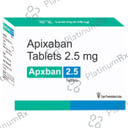
₹349
₹180
MRP ₹360
Apixaban 2.5mg
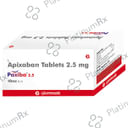
₹140.6
₹180
MRP ₹360
Apixaban 2.5mg
₹180
MRP ₹360
Apixaban 5mg

₹164.9
₹253
MRP ₹506
Apixaban 5mg

₹186.2
₹253
MRP ₹506
Apixaban 5mg
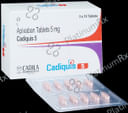
₹102.7
₹253
MRP ₹506
Apixaban 5mg
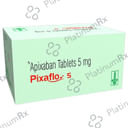
₹147.7
₹253
MRP ₹506
Apixaban 5mg

₹240
₹253
MRP ₹506
Apixaban 5mg
₹253
MRP ₹506
Apixaban 5mg

₹509.1
₹253
MRP ₹506
Apixaban 2.5mg
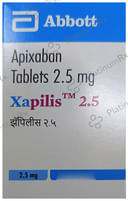
₹170.2
₹180
MRP ₹360
Apixaban 5mg
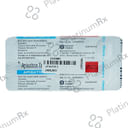
₹65.6
₹253
MRP ₹506
Apixaban 5mg

₹239
₹253
MRP ₹506
Apixaban 2.5mg

₹115
₹180
MRP ₹360
Apixaban 2.5mg

₹46.9
₹180
MRP ₹360
Apixaban 2.5mg

₹123.8
₹180
MRP ₹360
Apixaban 5mg

₹185.6
₹253
MRP ₹506
Apixaban 2.5mg

₹182.8
₹180
MRP ₹360
Apixaban 5mg

₹210.9
₹253
MRP ₹506
Flat ₹100 off on first app order | Use Code: APP100 |
Flat ₹100 off on first app order
USE CODE: APP100

Download Now